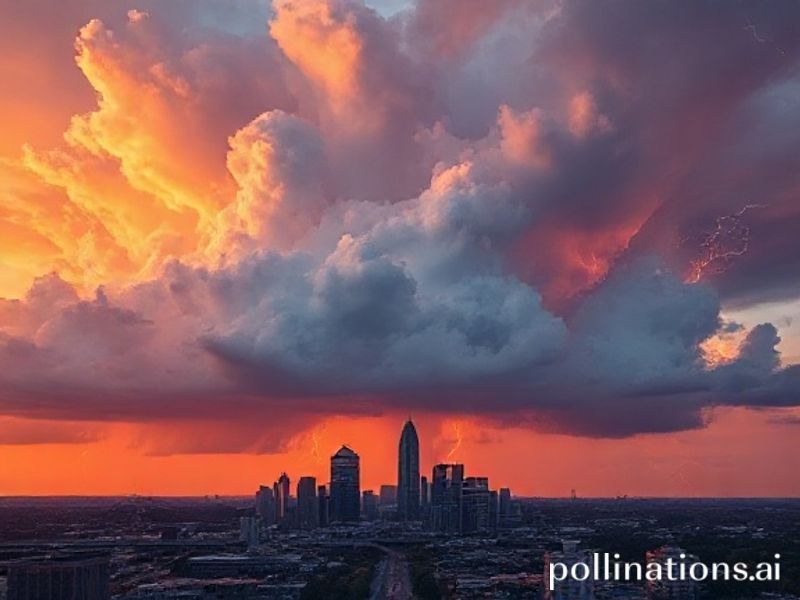Dallas Weather Goes Global: Why a Texas Tempest is Rebalancing the Planet’s Ledgers
Dallas, Texas—never the shy type—has spent the last few weeks auditioning for the Four Horsemen. One moment it’s 28 °C and the cicadas are gossiping like hedge-fund analysts at a rooftop bar; the next, marble-sized hail is auditioning for the lead role in “The Day After Tomorrow: Suburban Edition.” International observers, once content to treat U.S. weather as a reality-TV spin-off, are now taking notes because what happens in Dallas no longer stays in Dallas. It ends up in German reinsurance spreadsheets, Thai rice futures, and the WhatsApp group of a bemused Somali shipping agent who wonders why his container of Texas cotton is now classified as “weather-delayed, possibly apocalyptic.”
Climate scientists—those chronically underfunded Cassandras—like to say the atmosphere is getting “more energetic,” which is a polite way of admitting the sky has started day-drinking. Dallas is simply the latest dive bar where the bouncer (the jet stream) has wandered off, letting tropical and polar air brawl over who gets to pick the jukebox. For the rest of the planet, the brawl’s soundtrack is a rising premium on catastrophe bonds and the gentle hiss of glaciers shrugging in resignation.
Europe, still congratulating itself on the Green Deal, watches with the smug detachment of a vegetarian at a barbecue until it remembers that the same Rossby waves corkscrewing through Texas will, in a fortnight, park a heat dome over Provence and evaporate the Rhône like yesterday’s absinthe. Asia’s manufacturing hubs feel the ripple when semiconductor plants in Allen, north of Dallas, shut down for a week because an EF-2 tornado mistook the parking lot for a bowling alley. Suddenly the global supply chain acquires yet another kink, and a Shenzhen factory manager learns the English phrase “act of God” really means “act of physics with Texan flair.”
South America, meanwhile, exports soy to feed the cows that graze under those same thunderheads. When drought and deluge take turns whipping the Southern Plains, Brazilian farmers receive cryptic telegrams from Chicago traders: “Pray for Dallas; we’re long on beef.” In the grand casino of commodities, weather is the house, and the house is drunk.
Closer to the moral event horizon, insurance adjusters have begun speaking in tongues. A Zurich actuary recently told a Davos panel that “Dallas is our petri dish for systemic risk,” which is boardroom argot for “We may have to invent new mathematics to stay solvent.” Lloyd’s of London now prices “convective storm clusters” the way medieval monks priced indulgences—by gut instinct and sheer desperation. Investors, ever the optimists, respond by packaging weather risk into ever more exotic derivatives, proving once again that if you can’t beat the apocalypse, you might as well sell tickets.
Local officials, bless their star-spangled hearts, continue to pave floodplains because growth is the Texan state religion and heresy is taxed at 2.7 %. They hold ribbon-cuttings for new toll roads just in time for the asphalt to buckle under 110 °F heat, then reappear on the evening news promising to “harden infrastructure,” a phrase that sounds vaguely pornographic and performs about as well. Residents, accustomed to the bipolar theatrics, stock both sunscreen and ice scrapers in the same glove compartment and treat evacuation orders like suggestions from a life coach they never hired.
Yet there is dark poetry in it all. Every supercell is a planetary telegram written in ionized scrawl: carbon here, consequence there, irony everywhere. The same global economy that shipped cheap T-shirts from Dhaka to Dallas returns the favor by shipping Dallas weather, slightly used, back across the jet stream. We are all, in the end, downwind.
As the sun sets—assuming it can penetrate the smoke from Oklahoma wildfires—Dallas rehearses tomorrow’s encore: maybe fog thick enough to gag a seagull, maybe hail sculpted into artisanal golf balls. The world will watch, adjust its spreadsheets, and mutter the universal mantra of late capitalism: “Interesting times, indeed.”







